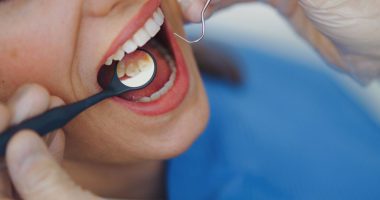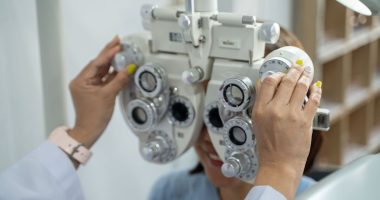Share this @internewscast.com
When you think about how to improve your heart health, do visions of treadmills and salad bowls enter your mind?
It’s true that eating more plant-based meals and moving your body on the reg are key heart-healthy habits. But that’s not all you can do to show your heart some love.
“In addition to a healthy diet, regular exercise, and abstaining from smoking, there are other everyday changes you can make to protect your heart health,” says Mary Greene, MD, a cardiologist with Manhattan Cardiology.
Here, we’ve rounded up the self-care measures that seem smaller on the heart-health scale but can actually make a big difference for your cardiovascular wellness.
1. Verify your vax
Are you up-to-date on vaccines, such as the flu and COVID shots? Getting these not only protects you from getting seriously ill, but it pays off for your heart, too.
“Staying up-to-date on vaccines, particularly if you have cardiovascular disease, can reduce your risk of being hospitalized or experiencing complications from illness like COVID or the flu,” says Glenn Levine, MD, professor of medicine at Baylor College of Medicine and volunteer medical expert for the American Heart Association.
For example, data in the Journal of the American College of Cardiology in 2023 found that being fully vaccinated against COVID is associated with a 41 percent lower risk of heart attack and stroke, and partial vaccination reduced that risk by 24 percent.
Along with vaccinations, don’t forget to practice proper hygiene, Dr. Levine adds. So suds up those hands well, and often.
2. Slip between the sheets from 10 to 11 p.m.
Sleep is wildly important for safeguarding your ticker, and we should all be aiming for the recommended seven to nine hours each night. But when you nod off may be important, too.
In a 2021 study on more than 100,000 people in the UK, those who went to bed between 10 and 11 p.m. had the lowest risk of cardiovascular disease, and this bedtime-heart health connection was especially strong in females, per the European Heart Journal – Digital Health. (The worst bedtime for your heart? After midnight.)
More research needs to be done to determine the reasons behind this connection, but it makes sense, if you think about it: If your workday starts at the standard 9 a.m., you likely need to wake up somewhere between 6 and 7:30 a.m. to get ready and get where you need to be. Working backwards, that means you need to hit the hay between 10 and 11 p.m. to log a full night’s rest.
To make this happen, set an alarm an hour before bedtime (so 9ish!) as a reminder to start to wind down and stop scrolling on your phone, says Dr. Levine. Establishing a solid before-bed routine can also cue up your brain and body for sleep, making it easier to drift off.
3. Ask your bed partner this simple question
Speaking of sleep, if you share a bed with a partner, give them a pop quiz tomorrow morning by asking “Do I snore?”
Snoring is one potential sign of obstructive sleep apnea (OSA), a condition where your airway becomes blocked throughout the night, resulting in brief pauses in breathing that momentarily wake you up, according to the National Heart, Lung, and Blood Institute. Daytime fatigue and problems with concentration are other red flags.
Unfortunately, OSA may be associated with high blood pressure and heart conditions such as coronary artery disease and may play a role in the development of heart failure, per the American Heart Association. But there’s good news: Sleep apnea is treatable via devices, surgery, and/or lifestyle changes.
If you are a chronic snorer—or your partner has been known to try to wake you up at night or leave the room to sleep elsewhere because of your sleep noises—have a chat with your doctor, who may recommend a sleep study.
4. Show yourself some slack
Perfectionism is tough to overcome, but we all make mistakes and don’t get it right every (or even most of?) the time. And that’s okay. What’s important is allowing yourself that grace and showing yourself acceptance and kindness—also called self-compassion—when faced with challenging moments.
What’s great is that literally being loving toward yourself is good for your heart: Research in Health Psychology in 2021 found that middle-aged women who scored higher on a validated self-compassion scale had less evidence of early signs of plaque formation in their arteries. (Over time, this buildup of plaque is what can cause a heart attack or stroke.)
So, remember that old adage of talking to yourself like you’d talk to a friend? You deserve that gentle voice, too.
5. Get a great de-stressor
One out of every two Americans have felt as if they’ve reached a stress breaking point so high they couldn’t function, according to a 2022 survey by Ipsos, a multinational market research company.
“Commitment to stress-management techniques on a daily basis is important, as we live in a ‘stressed out’ society, and chronic stress may lead to heart disease,” Dr. Greene says.
Simmering in a chronic state of stress speeds up atherosclerosis, or the buildup of sticky plaque in arteries that, over time, causes a blockage, research in the Journal of Clinical Medicine in 2022 notes. That’s why having a solid stress-management plan in your back pocket is a must.
Stress is a necessary part of life, but how you respond to it matters, Dr. Greene says. There are so many stress-management strategies available to you, and it’s up to you to discover what resonates and feels best, such as learning box breathing, trying progressive muscle relaxation, taking a five-minute walk outside, or giving your dog a hug.
6. Brush and floss tonight
Yes, you should brush your teeth twice and floss once per day, but the benefits aren’t just for bright chompers—it’s for the sake of your heart, too.
Though the research isn’t conclusive, “we do know that oral microbes that can be pathogenic to the heart can gain access to the bloodstream and into the heart via your gums,” Dr. Greene says.
Along with these daily good-gum habits, it’s also important to see your dentist regularly (ask them what interval is best). Make sure your next appointment is already on your calendar.
7. Share a meme with a friend
Maintaining strong friendship and social circles is key for healthy heart aging. In fact, older adults who had poor social health were 42 percent more likely to develop heart disease and twice as likely to die from the disease over a period of five years compared to those who had greater social support, according to a 2021 study in BMC Geriatrics.
Now’s the time to reach out with something that’ll make you both LOL—after all, laughter has been shown to be some pretty great medicine for the heart, too.














